Faye L. Booth's Blog, page 2
May 27, 2011
Character names - intuitive or symbolic?
There's a link going around on Twitter at the moment to
Overall, I have no hard and fast rules. Ultimately, none of my characters end up with names that just don't 'feel right' on a gut level, so that's a huge part of it, and certainly some of my main characters (Molly in Mirrors, Lydia in Trades) have simply been named on pure instinct; as if I 'met' them and they told me their name. There is some degree of logic and conscious thought that goes into it, too: a person's geographical location and/or ancestry can obviously influence the likelihood of them having a certain first name and especially surname - you'll find quite a few northern surnames in my work (not least the one on the book covers!). In working class characters in particular, trade-based surnames are more likely (hence Molly's maiden name of Pinner, and the 'abbess' in Trades whose surname is Tanner).
There is something to be said, though, for a more artistic choice of names; choosing one or more of a character's names to convey something about them through the meaning of the name itself, and I've certainly done that, too, either to confirm that the name my gut favours is the right one, or as the primary means of naming the character (although as I say, I still have to feel 'right' about any name choices). The main character in my most recently completed novel, Ivy, was an Ivy to me from the moment of her conception, but the context of the story (wait and see) makes a plant-based name particularly appropriate for her. Another one of that book's protagonists was very deliberately given a name that makes reference to one of her less desirable attitudes; and yet another has a name that makes an obscure religious reference to her relationship to Ivy. Anyway. When looking into name meanings, I like
And the WIP? Well, there are two protagonists this time, both of them named primarily on instinct; but in a nifty twist, their first names mean hardworking and fighter, and those descriptions fit their respective personalities pretty well.
So how do you name your characters?
Overall, I have no hard and fast rules. Ultimately, none of my characters end up with names that just don't 'feel right' on a gut level, so that's a huge part of it, and certainly some of my main characters (Molly in Mirrors, Lydia in Trades) have simply been named on pure instinct; as if I 'met' them and they told me their name. There is some degree of logic and conscious thought that goes into it, too: a person's geographical location and/or ancestry can obviously influence the likelihood of them having a certain first name and especially surname - you'll find quite a few northern surnames in my work (not least the one on the book covers!). In working class characters in particular, trade-based surnames are more likely (hence Molly's maiden name of Pinner, and the 'abbess' in Trades whose surname is Tanner).
There is something to be said, though, for a more artistic choice of names; choosing one or more of a character's names to convey something about them through the meaning of the name itself, and I've certainly done that, too, either to confirm that the name my gut favours is the right one, or as the primary means of naming the character (although as I say, I still have to feel 'right' about any name choices). The main character in my most recently completed novel, Ivy, was an Ivy to me from the moment of her conception, but the context of the story (wait and see) makes a plant-based name particularly appropriate for her. Another one of that book's protagonists was very deliberately given a name that makes reference to one of her less desirable attitudes; and yet another has a name that makes an obscure religious reference to her relationship to Ivy. Anyway. When looking into name meanings, I like
And the WIP? Well, there are two protagonists this time, both of them named primarily on instinct; but in a nifty twist, their first names mean hardworking and fighter, and those descriptions fit their respective personalities pretty well.
So how do you name your characters?
Published on May 27, 2011 08:00
May 26, 2011
Historical novelists do it with the dead.
The lovely Melanie over at Madame Guillotine has just made a brilliant post on her 'historical crushes' (or 'dead guy crushes' as I call them), and naturally I couldn't resist doing one of my own (so to speak). So, a few historical personages I wouldn't have kicked out of bed (although I would now - eww):
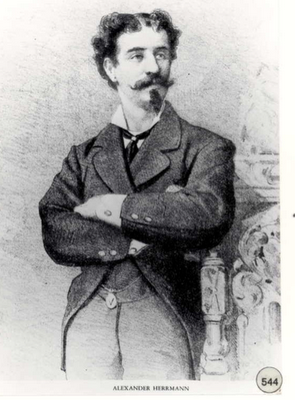
French stage magician Alexander Herrmann (1844-1896), better known in his day as Herrmann the Great. His wife Adelaide took over his show after his death and went on to become one of the first (and still one of very few) female magicians (as opposed to assistants, in manner of The Lovely Miss Debbie McGee).
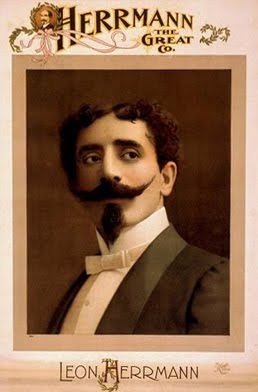
Leon Herrmann (1867-1909), nephew of Alexander and Adelaide, who definitely took after his uncle in the looks department! He was also a magician, touring with his aunt Adelaide until 'creative differences' put them on separate paths.
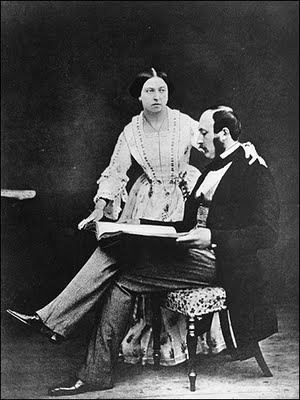
Prince Albert of Saxe-Coburg and Gotha (1819-1861). Yes, it's a cliché for a Victoriana junkie, I know, but I can't fault Vic's taste. Something about Albert must appeal to chubby, pale chicks with mops of dark hair.
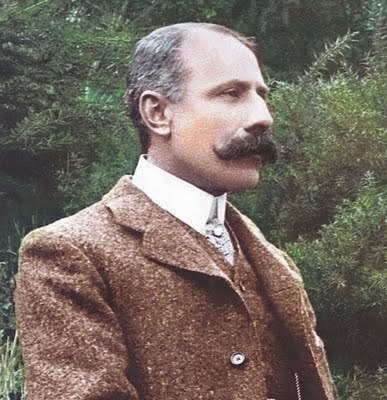
Edward Elgar (1857-1934). Composer and the man who makes £20 notes even more fun, Elgar is someone whose looks I first found myself paying proper attention to when I was in WH Smith and noticed that the portrait of him on the cover of Classic FM magazine was rather tasty. When image-googling for pics for this post, though, I was even more floored when I found this pic, posed by Elgar in about 1900, because it looks as if ageing made him into an eerie likeness of one of the characters in my most recently completed novel (he needs sideburns as well as a moustache, though). It's not an exact match - outside of identical twinning, two people rarely are, even if one's imaginary - but it's quite uncanny.
And...er...
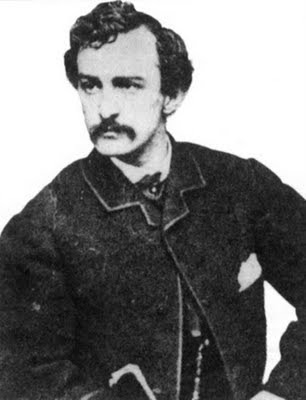
John Wilkes Booth (1838-1865). Before I go any further, I should stress that this has nothing to do with his politics, which were undoubtedly vile - I'm just putting that aside for the moment and looking at the exterior, because it's much nicer to look at. An actor before he decided to give generations of politicians an uneasy feeling about visiting the theatre, JWB came from a family of actors (including his brother Edwin, who was also quite nice-looking but - cringe - not as attractive, for my money, as his homicidal little bro), and was considerably famous before adding an in- prefix to the word. As one commenter on a pic of JWB on Tumblr recently remarked, it was a bit like Brad Pitt murdering Barack Obama (although I've never really been a Pitt girl, myself). So yes - Johnny's politics and psycho streak bad, looks good (at least before the soldiers got hold of him).
So, like Melanie, I'm looking back over those pics to see if I can identify a 'type'. There is one obvious connection, I suppose, although I hasten to add it's not a requirement, and by no means do I find all moustaches attractive - the droopy handlebar ones beloved of male members of stoner rock bands, for instance, just make me want to reach for bleach spray and a scouring pad, somehow. Still, I do like a well-kept 'tache, possibly because it tends to look quite old-fashioned. As I was recently telling my agent, during the World Cup some of our local buses had photos on the side of the Preston North End footy team circa 1890-odd, and I was both surprised and amused to see that, despite being pro footballers and decked out in their team strip and what have you, the players all still had immaculate hair and well-trimmed 'taches. As I said to Edwin, I was then forced to conclude that the last time a professional footballer was attractive was during the 19th century...
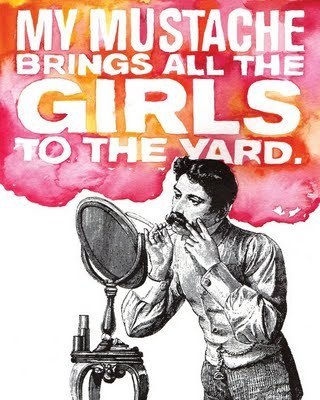
So, who are your dead guy/girl crushes?

French stage magician Alexander Herrmann (1844-1896), better known in his day as Herrmann the Great. His wife Adelaide took over his show after his death and went on to become one of the first (and still one of very few) female magicians (as opposed to assistants, in manner of The Lovely Miss Debbie McGee).

Leon Herrmann (1867-1909), nephew of Alexander and Adelaide, who definitely took after his uncle in the looks department! He was also a magician, touring with his aunt Adelaide until 'creative differences' put them on separate paths.

Prince Albert of Saxe-Coburg and Gotha (1819-1861). Yes, it's a cliché for a Victoriana junkie, I know, but I can't fault Vic's taste. Something about Albert must appeal to chubby, pale chicks with mops of dark hair.

Edward Elgar (1857-1934). Composer and the man who makes £20 notes even more fun, Elgar is someone whose looks I first found myself paying proper attention to when I was in WH Smith and noticed that the portrait of him on the cover of Classic FM magazine was rather tasty. When image-googling for pics for this post, though, I was even more floored when I found this pic, posed by Elgar in about 1900, because it looks as if ageing made him into an eerie likeness of one of the characters in my most recently completed novel (he needs sideburns as well as a moustache, though). It's not an exact match - outside of identical twinning, two people rarely are, even if one's imaginary - but it's quite uncanny.
And...er...

John Wilkes Booth (1838-1865). Before I go any further, I should stress that this has nothing to do with his politics, which were undoubtedly vile - I'm just putting that aside for the moment and looking at the exterior, because it's much nicer to look at. An actor before he decided to give generations of politicians an uneasy feeling about visiting the theatre, JWB came from a family of actors (including his brother Edwin, who was also quite nice-looking but - cringe - not as attractive, for my money, as his homicidal little bro), and was considerably famous before adding an in- prefix to the word. As one commenter on a pic of JWB on Tumblr recently remarked, it was a bit like Brad Pitt murdering Barack Obama (although I've never really been a Pitt girl, myself). So yes - Johnny's politics and psycho streak bad, looks good (at least before the soldiers got hold of him).
So, like Melanie, I'm looking back over those pics to see if I can identify a 'type'. There is one obvious connection, I suppose, although I hasten to add it's not a requirement, and by no means do I find all moustaches attractive - the droopy handlebar ones beloved of male members of stoner rock bands, for instance, just make me want to reach for bleach spray and a scouring pad, somehow. Still, I do like a well-kept 'tache, possibly because it tends to look quite old-fashioned. As I was recently telling my agent, during the World Cup some of our local buses had photos on the side of the Preston North End footy team circa 1890-odd, and I was both surprised and amused to see that, despite being pro footballers and decked out in their team strip and what have you, the players all still had immaculate hair and well-trimmed 'taches. As I said to Edwin, I was then forced to conclude that the last time a professional footballer was attractive was during the 19th century...

So, who are your dead guy/girl crushes?
Published on May 26, 2011 03:10
May 25, 2011
Guess-the-book meme: answers
So, it's Wednesday, and therefore here are the promised answers to my picks for the guess-the-book meme, complete with some juicy extracts just to liven things up a little:
1) The Crimson Petal and the White by Michel Faber (guessed by a couple of people)
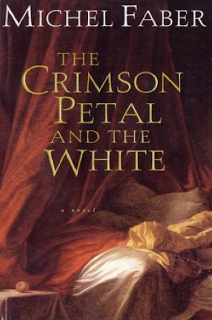
A couple of months ago, my agent and I were talking about negative publicity and whether or not it actually exists, and he asked me if I'd ever bought a book because of a bad review. For some reason, I must have been overtaken by amnesia, because I said that I hadn't because I don't read reviews (good or bad) of fiction. This is the case now (I got bored with the comic potential of other people's outrage), but in fact I actually bought some of my favourite books - including this one - at least partly because some shrieking one-star Amazon reviewer was OMGSHOCKEDANDAPPALLED. If I recall correctly, my already-keen interest in Crimson Petal's blurb was tipped into clicking the 'add to basket' button by a very promising claim that one could not be in favour of women's rights and make it through the book. (What can I say - I don't like being told what I will and won't manage to do.) Not only was that statement spectacularly wrong (and incredibly dense: as anyone who's read the book will know, the most intelligent, likeable, compassionate and complex character in the book is a woman), the book swiftly became one of my all-time favourites; so much so, I haven't had the nerve to watch the recent BBC adaptation of it because I've seen too many lousy adaptations and can't bear to find out if that one's bad, too. It's a huge book and populated by many characters - prostitutes Caroline and Sugar; businessman William Rackham, who sets himself up as Sugar's sole patron; Rackham's 'mad wife in the attic' Agnes and his tragically devout brother Henry; Mrs Fox, the object of Henry's repressed affections - so it's difficult to give a neat summary of the plot, but well worth reading. In these extracts, I think you can see Faber's skill in approaching his role as narrator for this story as something like a tour guide, taking 21st century-dwellers for a walk in the Victorian slums of London:
It's an ashen hour of night, blackish-grey and almost readable like undisturbed pages of burnt manuscript. You blunder forward into the haze of your own spent breath, still following me. The cobblestones beneath your feet are wet and mucky, the air is frigid and smells of sour spirits and slowly dissolving dung. You hear muffled drunken voices from somewhere nearby, but what little you can understand doesn't sound like the carefully chosen opening speeches of a grand romantic drama; instead, you find yourself hoping to God that the voices come no closer.
Church Lane is the sort of street where even the cats are thin and hollow-eyed for want of meat, the sort of street where men who profess to be labourers never seem to labour and so-called washerwomen rarely wash. Do-gooders can do no good here, and are sent on their way with despair in their hearts and shit on their shoes.
2) We Need To Talk About Kevin by Lionel Shriver (guessed by one person)
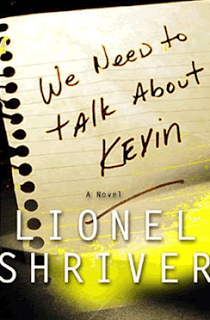
It embarrasses me that I took so long to read this book. I first picked it up just after I finished the first draft of my most recently completed novel - it was one of those always-thought-it-sounded-interesting-but-never-seemed-to-get-around-to-it jobs. Wow. I was missing out. Those who know me know about my raging tocophobia and utter disinterest in children, and after reading this book, there's no way I'd attempt to write a detailed account of why I'm perpetually on the verge of attempting to tie my own tubes with a kitchen knife and a couple of rubber bands, because I could never top Kevin. A story about a successful career woman, Eva, who from the moment she becomes pregnant has misgivings and when her son is born is herself horrified that she feels nothing, who spars with said offspring throughout his childhood and watches his conduct become gradually malign until as a teenager he commits mass murder; what makes this book even more compelling is the obvious parallels between Eva and her son - intelligent, arch, cynical, witty and often cruel, the apple hasn't fallen too far from the tree. Kevin is, essentially, a more extreme version of his mother, which even if (like Eva) I wasn't terrified at the prospect of giving birth and bored by small children, I would find decidedly unsettling. I don't want to know what a more extreme version of me would be like, and I'm glad I don't have to find out. Interestingly, Shriver has often remarked that she finds readers of Kevin tend to fall into two distinct camps: those who think Kevin is a demon seed and his mother never bonded with him because she could sense it, and those who think he became that way because he picked up on Eva's coldness (the classic nature/nurture debate). The book doesn't attempt to answer that question - how can one realistically answer such a question? - but that's another thing I love about it: it acknowledges the complexity and mystery of human minds. For the curious, I lean towards siding with Eva, but I freely admit that in that I am arguably as much of an unreliable witness as she is, because I have so many of the same aversions to the concept of parenthood. Speaking of which, as well as an amusing account of the fantasy of teaching versus the reality, the last sentence of this quote was one of those 'YES!' moments for me; something I've always thought when faced with people who 'love children'. As you can also see from this quote, the book is also (and unexpectedly, perhaps) hilarious:
Miss Fabricant was in no mood for drollery. I felt that in general her early twenties exhilaration at molding all those receptive little moppets into multiculturally aware, environmentally responsible vegetarians driven to rectify inequities in the Third World was beginning to fray around the edges. This was her first year of flaking poster paint from her eyebrows, going to sleep at night with the salty taste of paste in her gums and exiling so many children at a shot for a "time-out" that there was no longer any activity to take a time out from. After all, she had announced at our introduction in September that she "simply loves children," a declaration of which I am eternally dubious. From young women like Miss Fabricant, with a blunt snub of a nose like a Charlotte potato and hips like Idahos, the infeasible assertion seems to decode, "I want to get married." Myself, after having not a child but this particular one, I couldn't see how anyone could claim to love children in the generic any more than anyone could credibly claim to love people in a sufficiently sweeping sense as to embrace Pol Pot, Don Rickles and an upstairs neighbour who does 2,000 jumping jacks at three in the morning.
3) On Chesil Beach by Ian McEwan (not guessed)
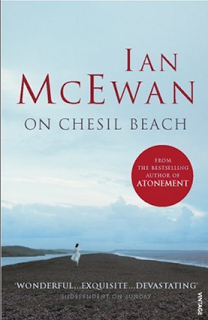
It's a close call, but this just (just) pips Atonement to the post as my favourite Ian McEwan novel. It's a relatively short book, and on the face of it a relatively 'small', insular story: Edward and Florence, a young, virgin couple on their wedding night in 1962; both of whom are nervous, for different reasons, about their forthcoming sexual initiation. I can't really go into too much detail without spoiling the book, but suffice to say that the narrative switches between their respective histories and the story of how they met and got together, and their exchanges in the honeymoon suite; and the reader watches as a combination of Edward and Florence's personality traits, past experiences and socially-enforced misinformation lead things to go spectacularly wrong. The following extracts say a lot about the say-nothing-and-save-face mentality of the times, just before the advent of the contraceptive pill:
While one heard of wealthier people going in for psychoanalysis, it was not yet customary to regard oneself in everyday terms as an enigma, as an exercise in narrative history, or as a problem waiting to be solved.
It is shaming sometimes, how the body will not, or cannot, lie about emotions. Who, for decorum's sake, has ever slowed his heart, or muted a blush?
4) Slammerkin by Emma Donoghue (not guessed)
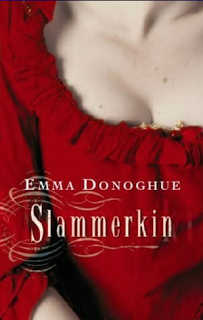
Hmm, the second appearance of historical prostitutes in this list - what's going on here? We're heading into the 18th century this time, though, for a story that is loosely based on historical fact - could only be loosely based on fact, given that all we know of the real Mary Saunders, who is the main character in this story, is that she was a London girl who worked for a time as a prostitute in the capital, before somehow ending up in Monmouth as a dressmaker's apprentice (by the way, a slammerkin was a style of loose dress worn in that period, which also gave rise to the term being used as slang for a 'loose woman'); a dressmaker she went on to be executed for murdering. (That's not a spoiler - it's nothing you won't get from blurbs and the like.) Around that skeletal, impersonal snippet, Donoghue has created an addictive tale of a girl fighting to get more out of life as she struggles to fit into a world which, after all she's seen and done, seems stultifyingly innocent and unworldly. Furthermore, Mary and Doll (the prostitute who takes the homeless teenage Mary under her wing) are a great deal of fun:
'Why did you take me in?' Mary asked her on the walk home that evening. Then she wished she could swallow the words again, because she feared they would make Doll turn cold and scornful, or tell her that her time was long up and she owed a pretty penny, by the way.
But Doll gave a peculiar smile, almost sheepish. 'When I stopped to look at you in the ditch, that morning, I was just curious,' she began. 'I was all set to walk on to the Cheshire Cheese in Fleet Street for my breakfast. But then you bit my hand, and I liked that.'
'You liked it?' asked Mary, bewildered.
'Showed some spirit,' said Doll with satisfaction. 'That's what I'd have done myself.'
5) Angel of Ruin (which goes by the duller title of Fallen Angel in the UK) by Kim Wilkins (not guessed)
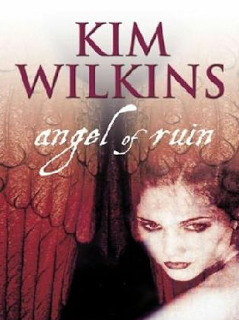
This is my favourite of Kim's books, and one I think would appeal to a lot of writers, being as it ultimately is about the power of storytelling, and the alarming compulsion one can feel to tell a tale. Like much of her work, it's a timeslip piece, alternating between modern-day journalist Sophie, who's looking for occult-themed stories to sell to Halloween issues of magazines, and Restoration-era London, with the three daughters of the poet John Milton, whose sisterly relationships are wonderfully drawn. It's a supernatural fantasy, too (I don't think the Miltons actually had a fallen angel living in their house), so that adds another element to the book; making the magic of storytelling quite literal:
'Look, this may sound a little strange,' I said, 'but an acquaintance of mine told me about you. She said you had an interesting story to tell.'
'I do.'
'I'm a journalist. I collect interesting stories.'
'I'm happy to tell you my story, but it may be dangerous for you to hear it.'
'Yes, yes, so I've heard. I'm afraid I don't hold much with such superstitions.'
'Even so, I have cautioned you.'
So yes, I recommend all of those - check 'em out, if you're thus inclined!
1) The Crimson Petal and the White by Michel Faber (guessed by a couple of people)

A couple of months ago, my agent and I were talking about negative publicity and whether or not it actually exists, and he asked me if I'd ever bought a book because of a bad review. For some reason, I must have been overtaken by amnesia, because I said that I hadn't because I don't read reviews (good or bad) of fiction. This is the case now (I got bored with the comic potential of other people's outrage), but in fact I actually bought some of my favourite books - including this one - at least partly because some shrieking one-star Amazon reviewer was OMGSHOCKEDANDAPPALLED. If I recall correctly, my already-keen interest in Crimson Petal's blurb was tipped into clicking the 'add to basket' button by a very promising claim that one could not be in favour of women's rights and make it through the book. (What can I say - I don't like being told what I will and won't manage to do.) Not only was that statement spectacularly wrong (and incredibly dense: as anyone who's read the book will know, the most intelligent, likeable, compassionate and complex character in the book is a woman), the book swiftly became one of my all-time favourites; so much so, I haven't had the nerve to watch the recent BBC adaptation of it because I've seen too many lousy adaptations and can't bear to find out if that one's bad, too. It's a huge book and populated by many characters - prostitutes Caroline and Sugar; businessman William Rackham, who sets himself up as Sugar's sole patron; Rackham's 'mad wife in the attic' Agnes and his tragically devout brother Henry; Mrs Fox, the object of Henry's repressed affections - so it's difficult to give a neat summary of the plot, but well worth reading. In these extracts, I think you can see Faber's skill in approaching his role as narrator for this story as something like a tour guide, taking 21st century-dwellers for a walk in the Victorian slums of London:
It's an ashen hour of night, blackish-grey and almost readable like undisturbed pages of burnt manuscript. You blunder forward into the haze of your own spent breath, still following me. The cobblestones beneath your feet are wet and mucky, the air is frigid and smells of sour spirits and slowly dissolving dung. You hear muffled drunken voices from somewhere nearby, but what little you can understand doesn't sound like the carefully chosen opening speeches of a grand romantic drama; instead, you find yourself hoping to God that the voices come no closer.
Church Lane is the sort of street where even the cats are thin and hollow-eyed for want of meat, the sort of street where men who profess to be labourers never seem to labour and so-called washerwomen rarely wash. Do-gooders can do no good here, and are sent on their way with despair in their hearts and shit on their shoes.
2) We Need To Talk About Kevin by Lionel Shriver (guessed by one person)

It embarrasses me that I took so long to read this book. I first picked it up just after I finished the first draft of my most recently completed novel - it was one of those always-thought-it-sounded-interesting-but-never-seemed-to-get-around-to-it jobs. Wow. I was missing out. Those who know me know about my raging tocophobia and utter disinterest in children, and after reading this book, there's no way I'd attempt to write a detailed account of why I'm perpetually on the verge of attempting to tie my own tubes with a kitchen knife and a couple of rubber bands, because I could never top Kevin. A story about a successful career woman, Eva, who from the moment she becomes pregnant has misgivings and when her son is born is herself horrified that she feels nothing, who spars with said offspring throughout his childhood and watches his conduct become gradually malign until as a teenager he commits mass murder; what makes this book even more compelling is the obvious parallels between Eva and her son - intelligent, arch, cynical, witty and often cruel, the apple hasn't fallen too far from the tree. Kevin is, essentially, a more extreme version of his mother, which even if (like Eva) I wasn't terrified at the prospect of giving birth and bored by small children, I would find decidedly unsettling. I don't want to know what a more extreme version of me would be like, and I'm glad I don't have to find out. Interestingly, Shriver has often remarked that she finds readers of Kevin tend to fall into two distinct camps: those who think Kevin is a demon seed and his mother never bonded with him because she could sense it, and those who think he became that way because he picked up on Eva's coldness (the classic nature/nurture debate). The book doesn't attempt to answer that question - how can one realistically answer such a question? - but that's another thing I love about it: it acknowledges the complexity and mystery of human minds. For the curious, I lean towards siding with Eva, but I freely admit that in that I am arguably as much of an unreliable witness as she is, because I have so many of the same aversions to the concept of parenthood. Speaking of which, as well as an amusing account of the fantasy of teaching versus the reality, the last sentence of this quote was one of those 'YES!' moments for me; something I've always thought when faced with people who 'love children'. As you can also see from this quote, the book is also (and unexpectedly, perhaps) hilarious:
Miss Fabricant was in no mood for drollery. I felt that in general her early twenties exhilaration at molding all those receptive little moppets into multiculturally aware, environmentally responsible vegetarians driven to rectify inequities in the Third World was beginning to fray around the edges. This was her first year of flaking poster paint from her eyebrows, going to sleep at night with the salty taste of paste in her gums and exiling so many children at a shot for a "time-out" that there was no longer any activity to take a time out from. After all, she had announced at our introduction in September that she "simply loves children," a declaration of which I am eternally dubious. From young women like Miss Fabricant, with a blunt snub of a nose like a Charlotte potato and hips like Idahos, the infeasible assertion seems to decode, "I want to get married." Myself, after having not a child but this particular one, I couldn't see how anyone could claim to love children in the generic any more than anyone could credibly claim to love people in a sufficiently sweeping sense as to embrace Pol Pot, Don Rickles and an upstairs neighbour who does 2,000 jumping jacks at three in the morning.
3) On Chesil Beach by Ian McEwan (not guessed)

It's a close call, but this just (just) pips Atonement to the post as my favourite Ian McEwan novel. It's a relatively short book, and on the face of it a relatively 'small', insular story: Edward and Florence, a young, virgin couple on their wedding night in 1962; both of whom are nervous, for different reasons, about their forthcoming sexual initiation. I can't really go into too much detail without spoiling the book, but suffice to say that the narrative switches between their respective histories and the story of how they met and got together, and their exchanges in the honeymoon suite; and the reader watches as a combination of Edward and Florence's personality traits, past experiences and socially-enforced misinformation lead things to go spectacularly wrong. The following extracts say a lot about the say-nothing-and-save-face mentality of the times, just before the advent of the contraceptive pill:
While one heard of wealthier people going in for psychoanalysis, it was not yet customary to regard oneself in everyday terms as an enigma, as an exercise in narrative history, or as a problem waiting to be solved.
It is shaming sometimes, how the body will not, or cannot, lie about emotions. Who, for decorum's sake, has ever slowed his heart, or muted a blush?
4) Slammerkin by Emma Donoghue (not guessed)

Hmm, the second appearance of historical prostitutes in this list - what's going on here? We're heading into the 18th century this time, though, for a story that is loosely based on historical fact - could only be loosely based on fact, given that all we know of the real Mary Saunders, who is the main character in this story, is that she was a London girl who worked for a time as a prostitute in the capital, before somehow ending up in Monmouth as a dressmaker's apprentice (by the way, a slammerkin was a style of loose dress worn in that period, which also gave rise to the term being used as slang for a 'loose woman'); a dressmaker she went on to be executed for murdering. (That's not a spoiler - it's nothing you won't get from blurbs and the like.) Around that skeletal, impersonal snippet, Donoghue has created an addictive tale of a girl fighting to get more out of life as she struggles to fit into a world which, after all she's seen and done, seems stultifyingly innocent and unworldly. Furthermore, Mary and Doll (the prostitute who takes the homeless teenage Mary under her wing) are a great deal of fun:
'Why did you take me in?' Mary asked her on the walk home that evening. Then she wished she could swallow the words again, because she feared they would make Doll turn cold and scornful, or tell her that her time was long up and she owed a pretty penny, by the way.
But Doll gave a peculiar smile, almost sheepish. 'When I stopped to look at you in the ditch, that morning, I was just curious,' she began. 'I was all set to walk on to the Cheshire Cheese in Fleet Street for my breakfast. But then you bit my hand, and I liked that.'
'You liked it?' asked Mary, bewildered.
'Showed some spirit,' said Doll with satisfaction. 'That's what I'd have done myself.'
5) Angel of Ruin (which goes by the duller title of Fallen Angel in the UK) by Kim Wilkins (not guessed)

This is my favourite of Kim's books, and one I think would appeal to a lot of writers, being as it ultimately is about the power of storytelling, and the alarming compulsion one can feel to tell a tale. Like much of her work, it's a timeslip piece, alternating between modern-day journalist Sophie, who's looking for occult-themed stories to sell to Halloween issues of magazines, and Restoration-era London, with the three daughters of the poet John Milton, whose sisterly relationships are wonderfully drawn. It's a supernatural fantasy, too (I don't think the Miltons actually had a fallen angel living in their house), so that adds another element to the book; making the magic of storytelling quite literal:
'Look, this may sound a little strange,' I said, 'but an acquaintance of mine told me about you. She said you had an interesting story to tell.'
'I do.'
'I'm a journalist. I collect interesting stories.'
'I'm happy to tell you my story, but it may be dangerous for you to hear it.'
'Yes, yes, so I've heard. I'm afraid I don't hold much with such superstitions.'
'Even so, I have cautioned you.'
So yes, I recommend all of those - check 'em out, if you're thus inclined!
Published on May 25, 2011 10:48
May 22, 2011
A guess-the-book meme.
A meme, just to pass the time:
List the first sentences of your five favourite books so that people can guess the books they come from. After three days, post the answers.
I'm terrible at coming up with definitive top tens/fives/threes of anything, but here (in a very loose and not-to-be-taken-too-seriously order) are the first sentences of five of my favourites:
1) Watch your step.
2) Dear Franklin, I'm unsure why one trifling incident this afternoon has moved me to write to you.
(The name should tip off anyone who's read that book.)
3) They were young, educated and both virgins on this, their wedding night, and they lived in a time when a conversation about sexual difficulties was plainly impossible.
(And this one's a minor blurb - again a good memory-nudger.)
4) There once was a cobbler called Saunders who died for eleven days.
5) I came to London to write and found myself practising magic instead.
Any guesses, before Wednesday comes?
List the first sentences of your five favourite books so that people can guess the books they come from. After three days, post the answers.
I'm terrible at coming up with definitive top tens/fives/threes of anything, but here (in a very loose and not-to-be-taken-too-seriously order) are the first sentences of five of my favourites:
1) Watch your step.
2) Dear Franklin, I'm unsure why one trifling incident this afternoon has moved me to write to you.
(The name should tip off anyone who's read that book.)
3) They were young, educated and both virgins on this, their wedding night, and they lived in a time when a conversation about sexual difficulties was plainly impossible.
(And this one's a minor blurb - again a good memory-nudger.)
4) There once was a cobbler called Saunders who died for eleven days.
5) I came to London to write and found myself practising magic instead.
Any guesses, before Wednesday comes?
Published on May 22, 2011 07:12
May 7, 2011
I love this moment...
...the moment of promise and anticipation, right before a first draft of a new book is started. In the spirit of my continual striving to make life difficult for myself, I'm tackling a project now that should prove challenging in a number of ways. Like the book I recently completed (which is now in the capable hands of my agent), I suspect the new WIP will be a lengthy brute - I'm not certain it will be as long (time will tell, though), but looking at my notes I doubt I'll get everything into a diminutive word count; and while the WIP doesn't have as many protagonists as the last book, the challenge of writing that one has opened up my confidence in many ways, and so now I'm tackling another couple of challenges; namely writing a story that spans over a considerable number of years and writing about people who really existed. I am not, I hasten to add, writing from the point of view of people who really existed - not that there's anything wrong with doing that, but something in me just prefers to really get inside the skulls of people who are figments of my imagination. Still, I could not tackle this subject and realistically hope to avoid actual historical personages making considerable appearances in the narrative, so for the first time I'm going to have to do it.
However, in order to feel more comfortable, I'm establishing some ground rules for myself, and here they are:
When writing about someone who actually existed, I will refer to the research I did on them before starting the book - recorded facts and events, quotes, personality, attitudes both of the person themselves and those of others whose descriptions of the person in question were based on actually knowing them etc - and I will not wander off that path into the realms of complete invention (that's reserved for the characters who are my own creations!). People who make the history books tend to leave us plenty to write about without adding myths to the canon.
In keeping with that, when the circumstances surrounding an event are unclear or unknown and for dramatic purposes I wish to cover them in more detail, I will do so using characters of my own creation. Coverage of actual historical events will be based on the detailed research I did beforehand.
I aim to present real people as accurately I can based on my research, and while that will hopefully give some insight into their perspectives and reasons for approaching things the way they did, that doesn't mean that I won't present them as naive, overly trusting or a complete twunt, should my research have given me evidence to hold such views; and I will not kowtow to the tradition of refusing to view certain people critically purely because they are known for being connected to certain things. Needless to say, I intend only to present such views evidentially throughout the narrative through the person's (historically recorded) attitudes and actions, and through the sorts of opinions about them that were recorded as coming from those around them.
So there they are - my three rules for tackling the enormous responsibility of writing about real people with (I hope!) ethics, honesty and rationality. Now I just have to see how well I do...
However, in order to feel more comfortable, I'm establishing some ground rules for myself, and here they are:
When writing about someone who actually existed, I will refer to the research I did on them before starting the book - recorded facts and events, quotes, personality, attitudes both of the person themselves and those of others whose descriptions of the person in question were based on actually knowing them etc - and I will not wander off that path into the realms of complete invention (that's reserved for the characters who are my own creations!). People who make the history books tend to leave us plenty to write about without adding myths to the canon.
In keeping with that, when the circumstances surrounding an event are unclear or unknown and for dramatic purposes I wish to cover them in more detail, I will do so using characters of my own creation. Coverage of actual historical events will be based on the detailed research I did beforehand.
I aim to present real people as accurately I can based on my research, and while that will hopefully give some insight into their perspectives and reasons for approaching things the way they did, that doesn't mean that I won't present them as naive, overly trusting or a complete twunt, should my research have given me evidence to hold such views; and I will not kowtow to the tradition of refusing to view certain people critically purely because they are known for being connected to certain things. Needless to say, I intend only to present such views evidentially throughout the narrative through the person's (historically recorded) attitudes and actions, and through the sorts of opinions about them that were recorded as coming from those around them.
So there they are - my three rules for tackling the enormous responsibility of writing about real people with (I hope!) ethics, honesty and rationality. Now I just have to see how well I do...
Published on May 07, 2011 03:30
April 1, 2011
Trades of the Flesh competition winners
Well, it's draw day! Thank you so much to everyone who entered - I wish I had more copies to offer, but unfortunately there were only five books to give away, and so here are the results:

The entries.
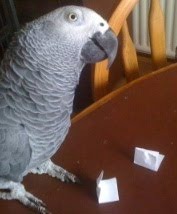
My lovely assistant Hugo after drawing the first two winners.

And the winners are...Rhian from MiddlesexBernd from ElmshornChris from AlabamaAaron from MichiganMichelle from PennsylvaniaThank you once again to everyone who entered, and I apologise to everyone I couldn't send a book to on this occasion. For those of you who did win, I'll be putting your books in the post tomorrow - four of you are overseas, so I'm not sure how long they'll take to arrive from the UK, but I'll get them to you as soon as I can!

The entries.

My lovely assistant Hugo after drawing the first two winners.

And the winners are...Rhian from MiddlesexBernd from ElmshornChris from AlabamaAaron from MichiganMichelle from PennsylvaniaThank you once again to everyone who entered, and I apologise to everyone I couldn't send a book to on this occasion. For those of you who did win, I'll be putting your books in the post tomorrow - four of you are overseas, so I'm not sure how long they'll take to arrive from the UK, but I'll get them to you as soon as I can!
Published on April 01, 2011 04:00
March 23, 2011
Interview on the Dear Author blog
I've just been informed that my interview with the Dear Author blog is up, so do check it out if you're thus inclined. I really enjoyed this interview, actually - there were some nice questions in there that made a change from the usual ones, so I'm pleased with how it's come out. Just one quick correction, though: Trades is set in Preston, not London!
*
In completely unrelated news, in my bid to dominate the publishing industry further (ha ha), I recently qualified as a proofreader and copy-editor, which as you can imagine makes me very happy. I did Chapterhouse Publishing's correspondence course, which I highly recommend as both enjoyable and informative, and one day while studying I snapped a photo on my phone of my cat Lucian 'helping'. My friend Dan couldn't resist turning the pic into a LOLcat, so to celebrate my successful exam results, here it is:
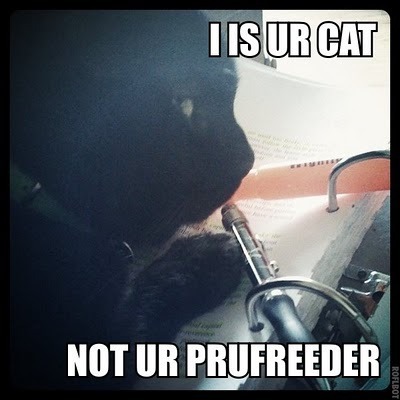

*
In completely unrelated news, in my bid to dominate the publishing industry further (ha ha), I recently qualified as a proofreader and copy-editor, which as you can imagine makes me very happy. I did Chapterhouse Publishing's correspondence course, which I highly recommend as both enjoyable and informative, and one day while studying I snapped a photo on my phone of my cat Lucian 'helping'. My friend Dan couldn't resist turning the pic into a LOLcat, so to celebrate my successful exam results, here it is:

Published on March 23, 2011 10:52
March 19, 2011
Smart Smut anthology
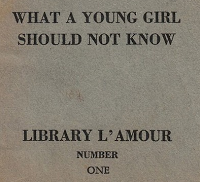 In all the fuss of the competition yesterday (by the way, I'm happy to see the entries coming in!), I forgot to mention that on a similarly risqué note, a short story of mine will, in the not-too-distant future, appear in an anthology of erotica. The anthology will be published by a new American imprint called Smart Smut, which aims to publish erotica with a more intellectual bent (which I think is a wonderful idea); and their inaugural publication is to be a collection of stories with a Shakespearean flavour. As soon as I know more details (publication date, price of the book, where to buy etc) I will of course pass on the information to you all.
In all the fuss of the competition yesterday (by the way, I'm happy to see the entries coming in!), I forgot to mention that on a similarly risqué note, a short story of mine will, in the not-too-distant future, appear in an anthology of erotica. The anthology will be published by a new American imprint called Smart Smut, which aims to publish erotica with a more intellectual bent (which I think is a wonderful idea); and their inaugural publication is to be a collection of stories with a Shakespearean flavour. As soon as I know more details (publication date, price of the book, where to buy etc) I will of course pass on the information to you all.
Published on March 19, 2011 17:10
March 18, 2011
Five copies of Trades of the Flesh to be won!
As those of you who follow me on Twitter will be aware, I recently received a generous pile of copies of the Tor Forge American edition of Trades of the Flesh. So generous, in fact, that they're threatening to take over, and so I have decided to hold a competition to find homes for some of them.
Therefore, it's competition time! I have five copies to give away, which will be signed and dated; but I also plan to make these five a little bit different by writing in each one a different smutty limerick, courtesy of The Pearl, one of the most well-known 'gentlemen's papers' of the period.
To enter, simply comment on this entry with your name and delivery address (in case you win!). I have to approve all comments on this blog, so there won't be a security risk: I will simply note your details without publishing your comment for the world to see. Two weeks from today, an independent third party (well, my parrot Hugo) will pick five winning entries from a receptacle of some description, and if you are one of the winners I will send your book out to you. Only one entry per person, please, and needless to say, if you're of a prudish temperament neither the book nor the Pearl 'Nursery Rhymes' will be your cup of tea!
The competition is now open until 1st April.


Therefore, it's competition time! I have five copies to give away, which will be signed and dated; but I also plan to make these five a little bit different by writing in each one a different smutty limerick, courtesy of The Pearl, one of the most well-known 'gentlemen's papers' of the period.
To enter, simply comment on this entry with your name and delivery address (in case you win!). I have to approve all comments on this blog, so there won't be a security risk: I will simply note your details without publishing your comment for the world to see. Two weeks from today, an independent third party (well, my parrot Hugo) will pick five winning entries from a receptacle of some description, and if you are one of the winners I will send your book out to you. Only one entry per person, please, and needless to say, if you're of a prudish temperament neither the book nor the Pearl 'Nursery Rhymes' will be your cup of tea!
The competition is now open until 1st April.

Published on March 18, 2011 15:23
March 5, 2011
Charming.
Writers, you know how you sometimes have those peevish moments when you're in a bookshop and they've got the publication of some obnoxious person (the ghostwritten 'autobiography' of a revolting reality TV celebrity; anything by Jeremy Clarkson* etc), but they don't have your book in stock? Annoying, isn't it?
Well, today in Waterstone's in Wigan I think I found the definitive example of that - they had two copies of Mein Kampf in! Two copies! There's no justice in the book retail trade.
And yes, I know they're there for historians to use as reference. My indignation here is comic license.
* Which reminds me of a joke, actually: did you know that the new dictionary definition of the word countryside is the act of assassinating Jeremy Clarkson? Boomboomtish.
Well, today in Waterstone's in Wigan I think I found the definitive example of that - they had two copies of Mein Kampf in! Two copies! There's no justice in the book retail trade.
And yes, I know they're there for historians to use as reference. My indignation here is comic license.
* Which reminds me of a joke, actually: did you know that the new dictionary definition of the word countryside is the act of assassinating Jeremy Clarkson? Boomboomtish.
Published on March 05, 2011 16:36
Faye L. Booth's Blog
- Faye L. Booth's profile
- 10 followers
Faye L. Booth isn't a Goodreads Author
(yet),
but they
do have a blog,
so here are some recent posts imported from
their feed.



